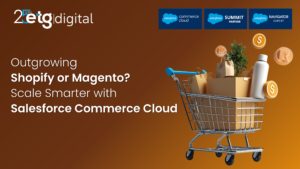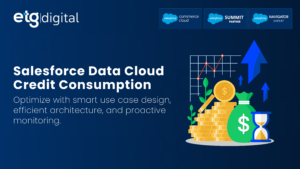Finding the right solution for your business in today’s fast-paced customer relationship management (CRM) landscape can be a daunting task. More so with the numerous options available, making it essential to compare the key players to evaluate which one aligns best with your organization’s unique needs. Which is why here’s the comparison between the two leading CRM platforms, Salesforce and Zoho CRM, to help you make your informed decision.
Salesforce CRM
Salesforce is a cloud-based CRM platform that empowers businesses to build strong customer relationships, streamline sales processes, and drive growth. With a comprehensive suite of features and capabilities, Salesforce offers a scalable and customizable solution for organizations of all sizes. Renowned for its user-friendly interface and extensive integration options, Salesforce has become a dominant player in the CRM market.
A few of the key Features and Benefits of Salesforce CRM
1. Sales Cloud
Sales Cloud empowers sales teams with tools for lead management, opportunity tracking, sales forecasting, and collaboration, enabling them to close deals more effectively.
2. Service Cloud
Service Cloud provides customer service teams with a 360-degree view of customers, allowing them to deliver personalized support across multiple channels, enhance customer satisfaction and more.
3. Marketing Cloud
Marketing Cloud offers robust marketing automation capabilities, including email marketing, social media management, and customer journey mapping, helping businesses create targeted campaigns, nurture leads and much more.
4. Commerce Cloud
Commerce Cloud enables organizations to create and manage online stores, optimize the customer shopping experience, and drive sales growth in the digital realm.
5. Community Cloud
Community Cloud facilitates the creation of online communities for customers, partners, and employees, fostering collaboration, knowledge sharing, and engagement.
6. Integration Capabilities
Salesforce’s AppExchange marketplace provides a vast selection of pre-built integrations with third-party applications, allowing seamless connectivity with other business systems.
7. AI-powered Insights
Salesforce’s Einstein AI brings artificial intelligence to the CRM platform, delivering predictive analytics, intelligent recommendations, and automation to enhance productivity and decision-making.
Zoho CRM
Zoho CRM is another cloud-based CRM software designed to help businesses manage their customer relationships efficiently. It offers a wide range of features and tools for sales, marketing, and customer support, providing organizations with a unified platform to engage with customers and streamline operations. Zoho CRM is known for its affordability and ease of use, making it an attractive option for small and medium-sized businesses.
Key Features and Benefits of Zoho CRM
1. Sales Automation
Zoho CRM enables businesses to automate sales processes, manage leads, track deals, and forecast sales, empowering sales teams to boost productivity and close more deals.
2. Marketing Automation
Offers tools for email marketing, lead generation, campaign management, and social media integration, allowing businesses to execute targeted marketing campaigns and measure their effectiveness.
3. Customer Support
Provides a ticketing system, knowledge base, and live chat functionality to help businesses deliver exceptional customer support and resolve issues promptly.
4. Analytics and Reporting
Zoho CRM offers robust reporting and analytics capabilities, allowing businesses to gain insights into sales performance, customer behavior, and marketing campaigns to make data-driven decisions.
5. Customization and Integration
Allows businesses to customize the CRM interface, workflows, and modules according to their unique requirements. It also integrates with other Zoho applications and third-party tools, ensuring seamless data flow across systems.
Salesforce CRM vs Zoho CRM: A Comparison
Let’s delve into a technical comparison between Salesforce and Zoho CRM to help you understand their strengths and differences.
1. Architecture & Deployment Options
Salesforce CRM is built on a multi-tenant cloud architecture, where multiple customers share the same infrastructure and resources while maintaining data isolation. This architecture provides scalability, security, and automatic upgrades. Salesforce offers various deployment options, including Salesforce’s own cloud infrastructure, public clouds like AWS, and private clouds for organizations with specific security and compliance requirements.
Zoho CRM in contrast also follows a multi-tenant architecture, where multiple customers share the same infrastructure but have data segregation. Zoho provides cloud-based deployment options, ensuring easy access, scalability, and automatic updates. They also offer an on-premises deployment option called Zoho CRM On-Premise for businesses that prefer to keep their data within their own infrastructure.
2. Customization & Extensibility
Salesforce offers extensive customization capabilities to tailor the platform to specific business needs. It provides a visual development environment called Lightning App Builder, which allows users to create custom applications, page layouts, and workflows without coding. Developers can also leverage Apex (Salesforce’s programming language) and Visualforce (a markup language) for advanced customization and integration with external systems.
Whereas Zoho offers customization features that allow users to modify layouts, fields, and modules to align with their business processes. Zoho Creator, a low-code development platform, enables users to build custom applications and workflows without coding. Zoho CRM also provides APIs and webhooks for integration with other applications and systems, extending its functionality.
3. Integration Capabilities
Salesforce offers robust integration capabilities with its extensive ecosystem of applications and services. It provides pre-built integrations through its AppExchange marketplace, offering seamless connectivity with popular tools such as email marketing platforms, accounting software, and customer support systems. Salesforce also provides APIs (SOAP and REST) for custom integrations, enabling businesses to connect Salesforce CRM with their existing systems.
Zoho too offers integration options with popular third-party applications such as G Suite, Office 365, MailChimp, and QuickBooks. It provides REST APIs for developers to build custom integrations with other systems. Zoho also offers a feature called Zoho Flow, which allows users to create workflows and automate tasks between different applications, simplifying data synchronization and process automation.
4. User Experience & Ease Of Use
Salesforce CRM has a modern and intuitive user interface, which has undergone continuous refinement over the years. Its user-friendly design, guided setup wizards, and comprehensive training resources make it relatively easy for users to navigate the platform.
Zoho CRM also provides a user-friendly interface, with a simple and clean layout. It offers a customizable home page, allowing users to personalize their workspace based on their preferences. In fact it is Zoho’s simplicity and ease of use that contribute to its popularity among small businesses.
5. Artificial Intelligence & Automation
Salesforce incorporates AI capabilities through its Einstein AI platform. Einstein provides features like predictive lead scoring, opportunity insights, automated email responses, and intelligent recommendations. It uses machine learning algorithms to analyze data and provide actionable insights, helping businesses make data-driven decisions and automate repetitive tasks.
Zoho offers AI-powered features through Zoho Assistant, which provides contextual suggestions and recommendations to users based on their interactions and data in the CRM. Zoho also offers workflow automation capabilities, allowing users to define and automate business processes, such as lead assignment, email notifications, and task creation.
6. Mobile Capabilities
Salesforce provides a robust mobile app called Salesforce Mobile, available for iOS and Android devices. The app offers a comprehensive set of features, allowing users to access customer data, manage tasks, collaborate with team members, and receive real-time updates on the go. It provides offline capabilities as well, allowing users to work even when an internet connection is not available.
Zoho as well offers a mobile app called Zoho CRM Mobile Edition, available for iOS and Android devices. The mobile app enables users to access customer information, manage leads and contacts, track sales activities, and collaborate with team members. It also provides offline access, allowing users to continue working without an internet connection and sync data when the connection is restored.
7. Support & Training
Salesforce provides comprehensive support options, including email, phone, live chat, training resources, and an active community of users and experts. The availability of multiple support channels ensures that businesses can get assistance whenever they need it.
Zoho on the other hand does not offer the same range of support options as Salesforce. It offers email and phone support, along with a knowledge base and community forum.
8. Scalability & Enterprise Capabilities
Salesforce offers robust scalability and enterprise-level capabilities, making it suitable for organizations of all sizes, including large enterprises with complex CRM needs. Its extensive set of features and integration options provide a high degree of flexibility to accommodate growing businesses.
While Zoho is well-suited for small and medium-sized businesses that require a cost-effective CRM solution. Zoho provides ample functionality for small businesses with less complex requirements, but does not offer the same level of scalability and advanced features as Salesforce.
9. Security & Compliance
Salesforce follows industry-standard security practices to protect customer data. It provides features like data encryption, user access controls, IP restrictions, and multi-factor authentication. Salesforce is compliant with various regulations, such as GDPR, HIPAA, and ISO 27001, ensuring data privacy and security for businesses operating in regulated industries.
Zoho offers features like data encryption, user access controls, audit logs, and IP restrictions, and complies with regulations such as GDPR, SOC 2, and ISO 27001, to ensure data protection and privacy for businesses.
10. Pricing & Affordability
Salesforce CRM is known for its higher price point, especially for larger organizations or those requiring advanced functionalities. It offers various editions, each with different pricing tiers, allowing businesses to select the one that aligns with their needs and budget. However, Salesforce’s pricing can be a barrier for small businesses or startups with limited resources.
In contrast, Zoho CRM is renowned for its affordability, making it an attractive option for small and medium-sized businesses. Zoho CRM offers different pricing plans, including a free edition with limited features, enabling businesses to get started without a significant financial commitment.
Choose The Right CRM & Partner For Your Business
Selecting the right CRM solution depends on various factors, including the size of your organization, budget, required features, and long-term goals. Both Salesforce CRM and Zoho CRM have their strengths and cater to different segments of the market.
- If you are a large enterprise with complex CRM needs, looking for extensive customization options, advanced features, and seamless integrations, Salesforce CRM is a robust choice. However, keep in mind that it comes with a higher price tag.
- On the other hand, if you are a small or medium-sized business seeking an affordable CRM solution with user-friendly interfaces, essential features, and decent customization options, Zoho CRM is worth considering.
Regardless of which CRM platform you choose, it is crucial to partner with an experienced implementation partner like ETG Digital. We can guide you through the implementation process, tailor the platform to your specific needs, and ensure a successful CRM adoption.
Ready to make an informed decision and embark on your CRM journey to drive customer engagement, improve operational efficiency, and accelerate business growth?
Contact our experts for a free consultation.
Reach out to us at info@etg.digital or call +1 469 666 1119.






